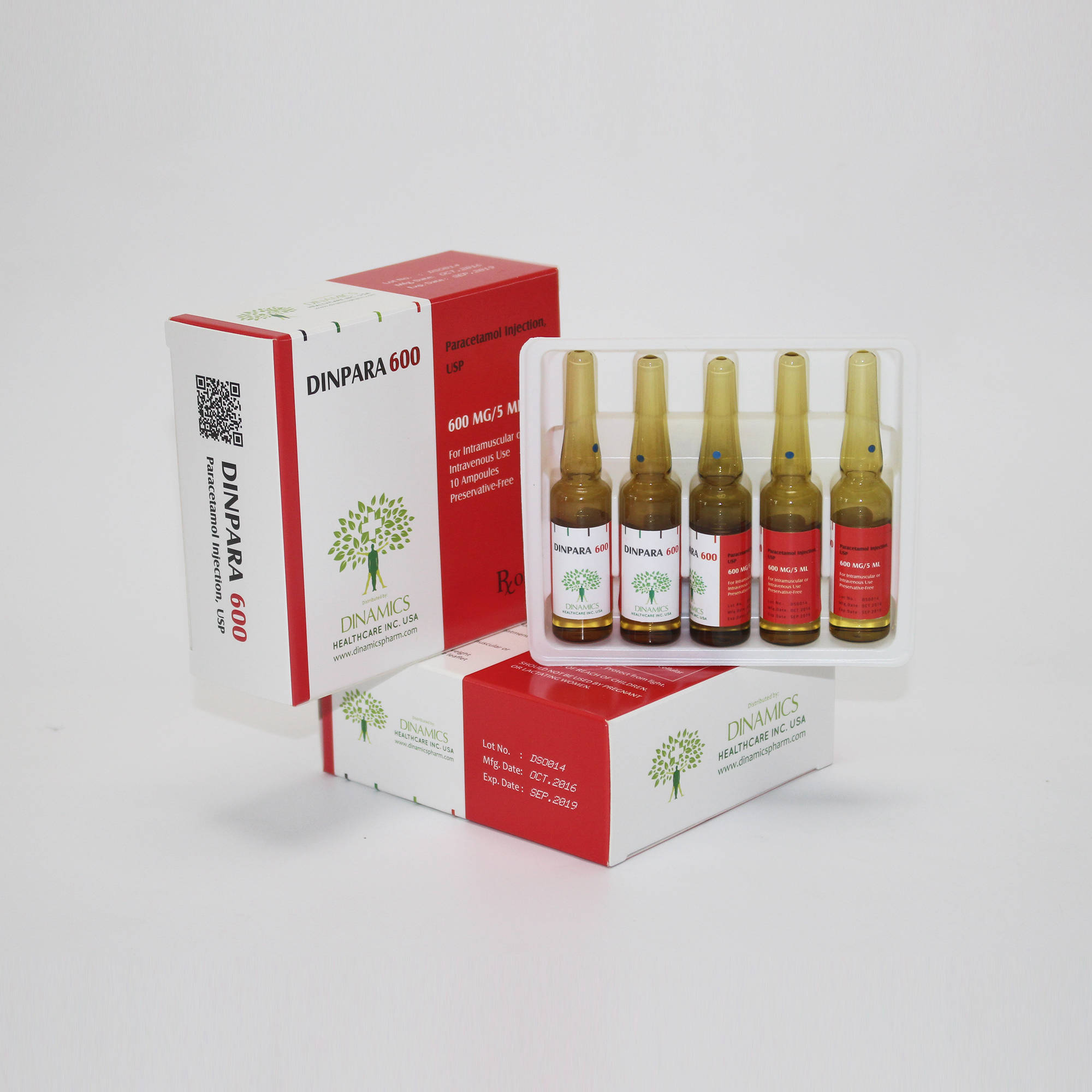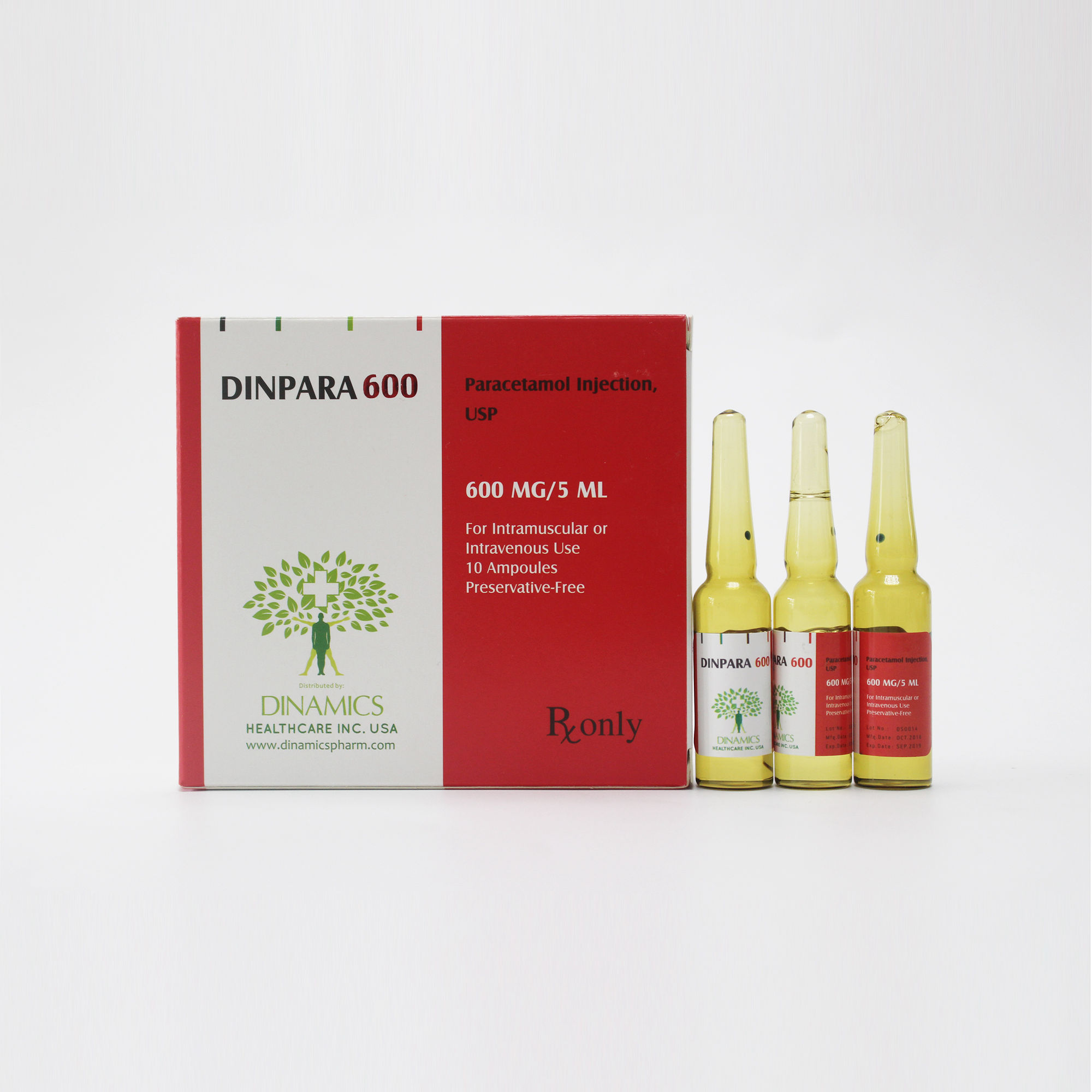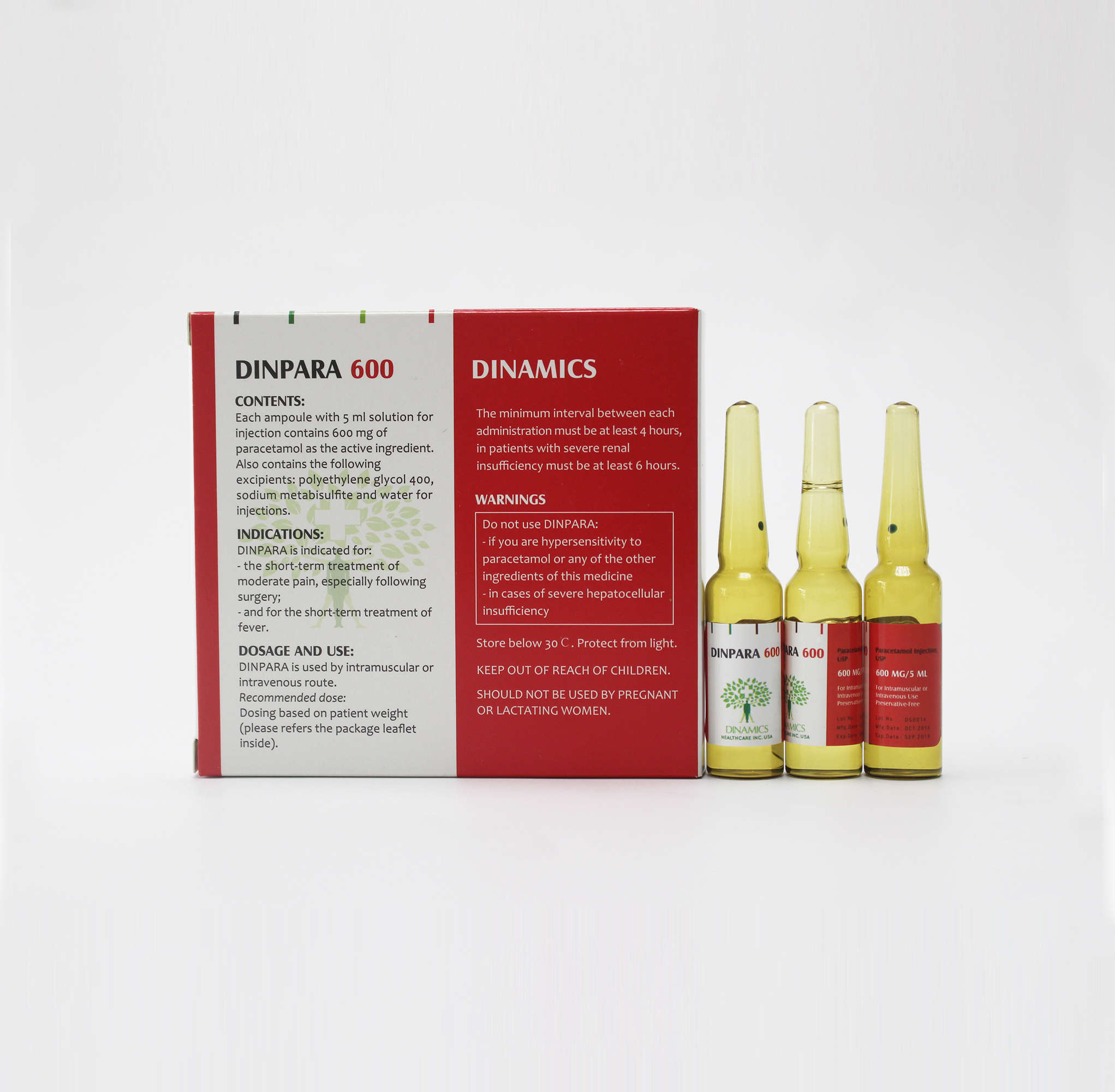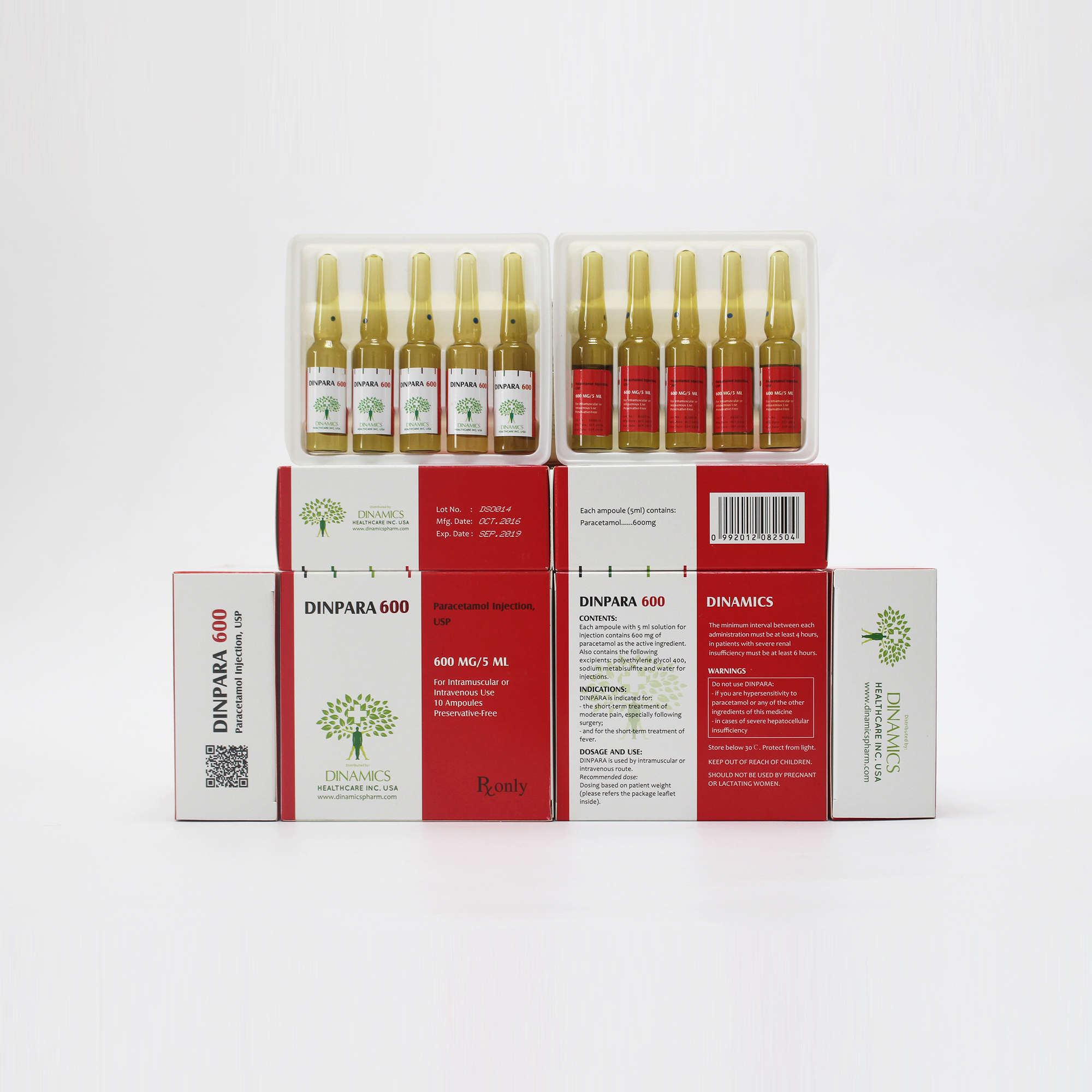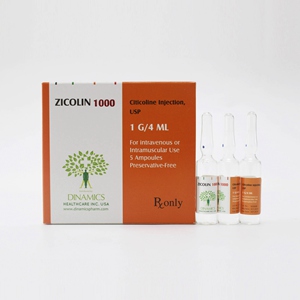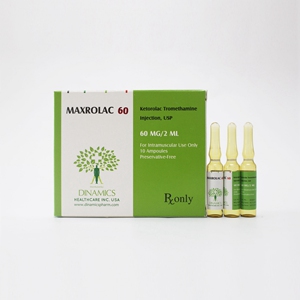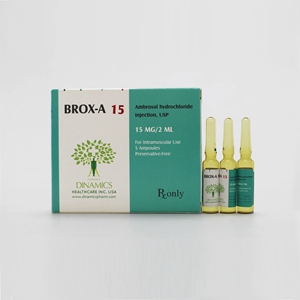Paracetamol Injection 600mg,USP
QUICK DETAILS:
DINPARA Contents:
• Each active substance is 600 mg of paracetamol
• The other ingredients are: polyethylene glycol 400, sodium metabisulfite and water for injections.
DINPARA Character:
•DINPARA is a clear, colorless solution, free from visible particles. It is supplied in a clear glass ampoule.
DINPARA Pack:
5 ampoules (3ml) per tray, 2 trays per carton
DESCRIPTION
1. What DINPARA is and what it is used for
This medicine contains the active substance of paracetamol, another name of acetaminophen, which is a analgesic and antipyretic similar to aspirin. But paracetamol is not an NSAID (Nonsteroidal Antiinflammatory Drug) as it doesn't participate in the inflammatory response.
Paracetamol injection is a sterile, colorless, non pyrogen solution. It is indicated for the short-term treatment of moderate pain, especially following surgery, and for the short-term treatment of fever, when administration by intramuscular or intravenous route is clinically justified by an urgent need to treat pain or hyperthermia and/or other routes of administration are not possible.
2. What you need to know before you take DINPARA
Do not use DINPARA:
-if you are hypersensitivity to paracetamol or any of the other ingredients of this medicine
-in cases of severe hepatocellular insufficiency
Contact your doctor or health care provider right away if any of these apply to you.
Warnings and Precautions
Warnings
It is recommended to use a suitable analgesic oral treatment as soon as this administration route is possible.
In order to avoid the risk of overdose, check that other medicines administered do not contain paracetamol.
Doses higher than the recommended entails risk for very serious liver damage. Clinical symptoms and signs of liver damage (including fulminant hepatitis, hepatic failure, cholestatic hepatitis, cytolytic hepatitis) are usually first seen after two days of drug administration with a peak seen usually after 4 - 6 days. Treatment with antidote should be given as soon as possible.
Precautions
Paracetamol should be used with caution in cases of:
-hepatocellular insufficiency,
-severe renal insufficiency (creatinine clearance ≤ 30 mL/min),
-chronic alcoholism,
-chronic malnutrition (low reserves of hepatic gluthatione),
-dehydration.
Other medicines and DINPARA
-Probenecid causes an almost 2-fold reduction in clearance of paracetamol by inhibiting its conjugation with glucuronic acid. A reduction in the paracetamol dose should be considered if it is to be used concomitantly with probenecid.
-Salicylamide may prolong the elimination t½ of paracetamol.
-Caution should be taken with the concomitant intake of enzyme-inducing substances.
-Concomitant use of paracetamol (4 g per day for at least 4 days) with oral anticoagulants may lead to slight variations of INR values. In this case, increased monitoring of INR values should be conducted during the period of concomitant use as well as for 1 week after paracetamol treatment has been discontinued.
Pregnancy and Lactation
Pregnancy
Paracetamol injection should only be used during pregnancy after a careful benefit-risk assessment. In this case, the recommended posology and duration must be strictly observed.
Lactation
After oral administration, paracetamol is excreted into breast milk in small quantities. No undesirable effects on nursing infants have been reported. Consequently, Paracetamol injection may be used in breast-feeding women.
Driving and Using Machines
Not relevant.
DIRECTION
1.How to take DINPARA
Intramuscular and intravenous route. Do not use if particulate matter or discoloration is observed. Do not add other medications to the paracetamol injection. Diazepam and chlorpromazine hydrochloride are physically
incompatible with paracetamol injection, therefore do not administer simultaneously.
Recommended dose:
Dosing based on patient weight (please see the dosing table here below):
|
Patient weight
|
Dose per administration
|
Maximum Daily Dose**
|
|
≤10kg*
|
7.5 mg/kg
|
30 mg/kg
|
|
>10kg to ≤33kg
|
15 mg/kg
|
60 mg/kg not exceeding 2g
|
|
>33kg to ≤50kg
|
15 mg/kg
|
60 mg/kg not exceeding 3g
|
|
>50kg with additional risk
factors for hepatotoxicity
|
500mg to 1g
|
3g
|
|
>50kg and no additional risk
factors for hepatotoxicity
|
500mg to 1g
|
4g
|
*Pre-term newborn infants: no safety and efficacy data are available for pre-term newborn infants.
**Maximum daily dose: The maximum daily dose as presented in the table above is for patients that are not receiving other paracetamol containing products and should be adjusted accordingly taking such products into account.
The minimum interval between each administration must be at least 4 hours. No more than 4 doses to be given in 24 hours.
The minimum interval between each administration in patients with severe renal insufficiency must be at least 6 hours.
In adults with hepatocellular insufficiency, chronic alcoholism, chronic malnutrition (low reserves of hepatic glutathione), dehydration: The maximum daily dose must not exceed 3 g.
2. Possible side effects
Like all medicines, this medicine can cause side effects, although not everybody gets them.
As all paracetamol products, adverse drug reactions are rare (>1/10000, <1/1000) or very rare (<1/10000), they are described below:
|
Organ system
|
Rare >1/10000, <1/1000
|
Very rare <1/10000
|
|
General
|
Malaise
|
Hypersensitivity reaction
|
|
Cardiovascular
|
Hypotension
|
|
|
Liver
|
Increased levels of hepatic transaminases
|
|
|
Platelet/blood
|
|
Thrombocytopenia,Leucopenia, Neutropenia.
|
Frequent adverse reactions at injection site have been reported during clinical trials (pain and burning sensation).
Very rare cases of hypersensitivity reactions ranging from simple skin rash or urticaria to anaphylactic shock have been reported and require discontinuation of treatment.
Cases of erythema, flushing, pruritus and tachycardia have been reported.
INGREDIENTS
Contents of the pack and other information
What DINPARA contains
• Each active substance is paracetamol. The contents of active substance were listed as following:
Brand Name Contents of active substance
DINPARA 375 Each ampoule (3ml) contains 600 mg of paracetamol
• The other ingredients are: polyethylene glycol 400, sodium metabisulfite and water for injections.
What DINPARA looks like and contents of the pack
•DINPARA is a clear, colorless solution, free from visible particles. It is supplied in a clear glass ampoule.
•Pack size:
Brand Name Pack size
DINPARA 600 5 ampoules (3ml) per tray, 2 trays per carton
STORE
How to store DINPARA
Keep this medicine out of the sight and reach of children.
Store at temperature not exceeding 30°C. Do not refrigerate or freeze.
Keep the ampoules in the outer carton until time of use in order to protect from light.
Do not use this medicine after the expiry date ‘EXP’ shown on the container. The expiry date refers to the last day of that month.
Do not throw away any medicines via wastewater or household. Ask your pharmacist how to throw away medicines you no longer use. These measures will help protect the environment.


